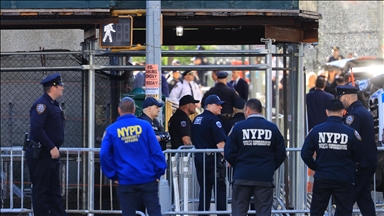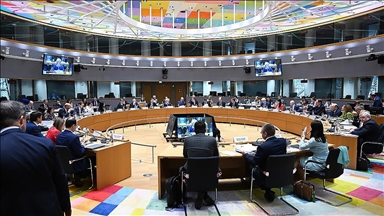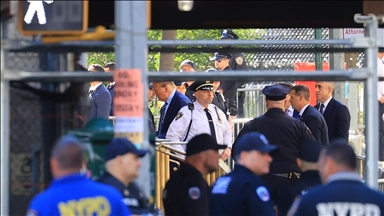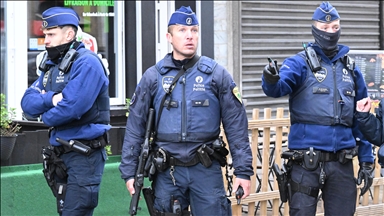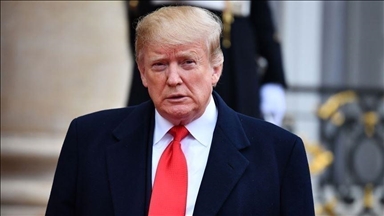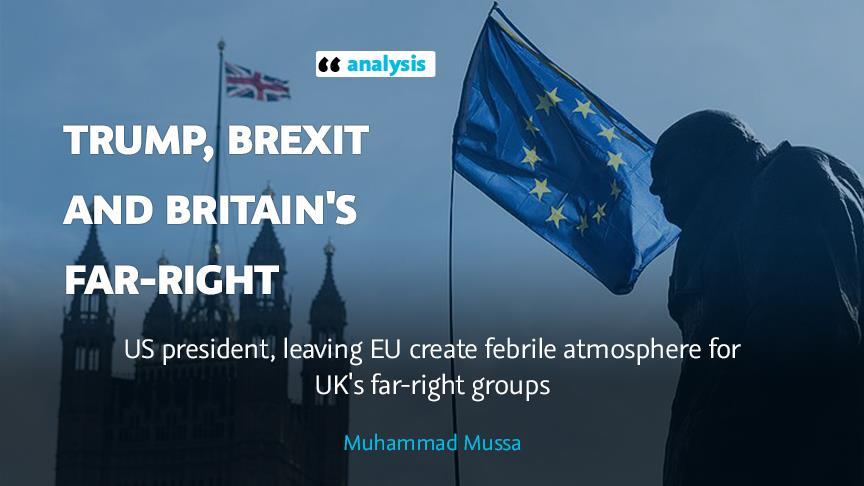
By Muhammad Mussa
LONDON
The British Isles is no stranger to the fanatic flavors of the far-right.
The advent of fascism in the U.K. came in the pre-war years with Oswald Mosley’s British Union of Fascists and evolved over the decades -- the National Front in the 1970s, the British National Party in the 1980s and the English Defence League and Britain First over the past decade.
These organizations were created as a response to Britain’s increasingly multicultural society as ethnic minorities arrived in the UK in search of a stable and secure life.
Though these organizations number in the many, they all espouse the same ideas and beliefs centered around opposition to immigration, fascism and nationalism.
They have emphasized in their manifestos their wish to preserve what they perceive to be the traditional British culture and have increasingly campaigned against the presence of non-white migrants.
Although these organizations have attempted to become involved in mainstream politics, they have nonetheless remained on the fringes of U.K. politics.
Anas Altikriti, CEO of The Cordoba Foundation, has said that “traditionally, the far-right in Britain has been associated with failure” and that “in the U.K. the main far-right political parties… have struggled to break into mainstream politics”.
In the last eight years, the English Defence League and Britain First have emerged as the most prominent far-right groups in the U.K.
Like their predecessors, they have continued to campaign against immigration and multiculturalism.
However, unlike their predecessors, they have increasingly taken on an anti-Islam platform, appealing to a nationalist sentiment that focuses on cultural differences with Muslim communities.
Hate crimes
Their campaigns consist of violent demonstrations against the supposed “Islamification of Britain”; “Christian patrols” among Muslim communities that harass Muslims as they go about their daily lives; and “Mosque invasions” in which they forcefully enter mosques and distribute Islamophobic literature.
These campaigns have drawn positive attention from certain segments of society where unemployment is high and there are a number of existing socio-economic problems.
As a result, the number of hate crimes against ethnic minorities, specifically Muslim communities, has risen in the last eight years.
In a 2010 survey on British social attitudes, 77 percent of respondents saw Islam as a threat to British life and 55 percent were bothered by the presence of mosques.
In 2012, parliament’s Home Affairs Select Committee reported that there were 17 terrorists with far-right links serving prison sentences.
On June 23, 2016, 52 percent of the U.K. electorate voted to leave the European Union.
This was in part due to fears, stoked by far-right groups and the eurosceptic U.K. Independence Party, that Britain and its native, white culture would be greatly undermined should it follow other EU nations in allowing refugees to settle.
As a result of the Brexit vote, hate crime in the U.K. has seen an exponential rise in comparison to previous years.
In its 2016 report, Tell MAMA, an organization that documents anti-Muslim attacks, reported that the number of hate crimes jumped from the average of 15 to 69 between June 24 and June 30 last year, an increase of 475 percent over previous months.
This showed a sharp rise in hate crime in the build-up to the EU referendum and also in the immediate aftermath of the vote.
Trump tweets
Furthermore, Tell MAMA reported a 44 percent rise in offline Islamophobic hate crimes in the month following the referendum, with 241 incidents recorded in July, up from 190 incidents a month earlier.
These attacks have been termed as “defensive” hate crimes, where the perpetrators belong to the white community and feel the need to protect their communities and culture from migrants who they deem to be invasive outsiders.
Moreover, they feel that their interests in society, such as control of resources and employment, are under threat from ethnic and migrant communities and thus, due to their insecurities, they respond by attacking those they see as representatives of such communities.
Although such incidents have long occurred, it can be argued that Brexit has acted as a catalyst in the spike in the number of hate crimes.
Far-right groups have also taken advantage of the Brexit vote and used it as an endorsement of their actions, arguing that the referendum has given them legitimacy.
On Nov. 29, U.S. President Donald Trump’s official Twitter account retweeted three anti-Muslim videos from the account of Jayda Fransen, the deputy leader of Britain First.
The unverified videos lacked context and portrayed Muslims in an aggressive and violent light.
By retweeting these inflammatory videos, the president of the United States, who has more than 40 million followers on Twitter, endorsed Britain First and gave the group a platform to continue its attacks against Muslims and other ethnic minorities.
Trump’s retweets drew anger and condemnation across the world. The Muslim Council of Britain, the largest U.K. body representing Muslims, released a statement condemning the “clearest endorsement yet from the U.S. president of the far-right and their vile anti-Muslim propaganda”.
There have been many calls to cancel Trump’s planned state visit to the U.K. and many have called on Prime Minister Theresa May to take a harder line with the president.
It is important to note that the Twitter account of Fransen, who was convicted of religiously aggravated harassment last year after abusing a woman wearing a hijab, has gained a large number of followers since she was retweeted by Trump.
[ The writer is a post-graduate student at the School of Oriental and African Studies, University of London. ]
* Opinions expressed in this article are the author’s own and do not necessarily reflect the editorial policy of Anadolu Agency.
Anadolu Agency website contains only a portion of the news stories offered to subscribers in the AA News Broadcasting System (HAS), and in summarized form. Please contact us for subscription options.


